Bioethical Implications of Child Labor in the US Agricultural Industry
VerifiedAdded on 2021/05/30
|7
|1933
|80
Essay
AI Summary
This essay examines the moral permissibility of utilizing children as farm workers in the United States, considering both the legal and ethical dimensions. It discusses how federal labor laws allow children above 12 to work on farms under certain conditions, highlighting the potential benefits of skill development and increased household income. However, the essay also critiques the double standards in these laws, pointing out the lack of protection for child farmworkers compared to other sectors, leading to exploitation, long hours, and hazardous working conditions. The essay further explores the plight of migrant children forced into farm work to support their families and argues for comprehensive changes in immigration and labor laws to protect children's well-being, health, and education, advocating for stricter regulations and enforcement to prevent child labor in the agricultural industry.

BIOETHICS
Name
Unit
Date
Name
Unit
Date
Paraphrase This Document
Need a fresh take? Get an instant paraphrase of this document with our AI Paraphraser
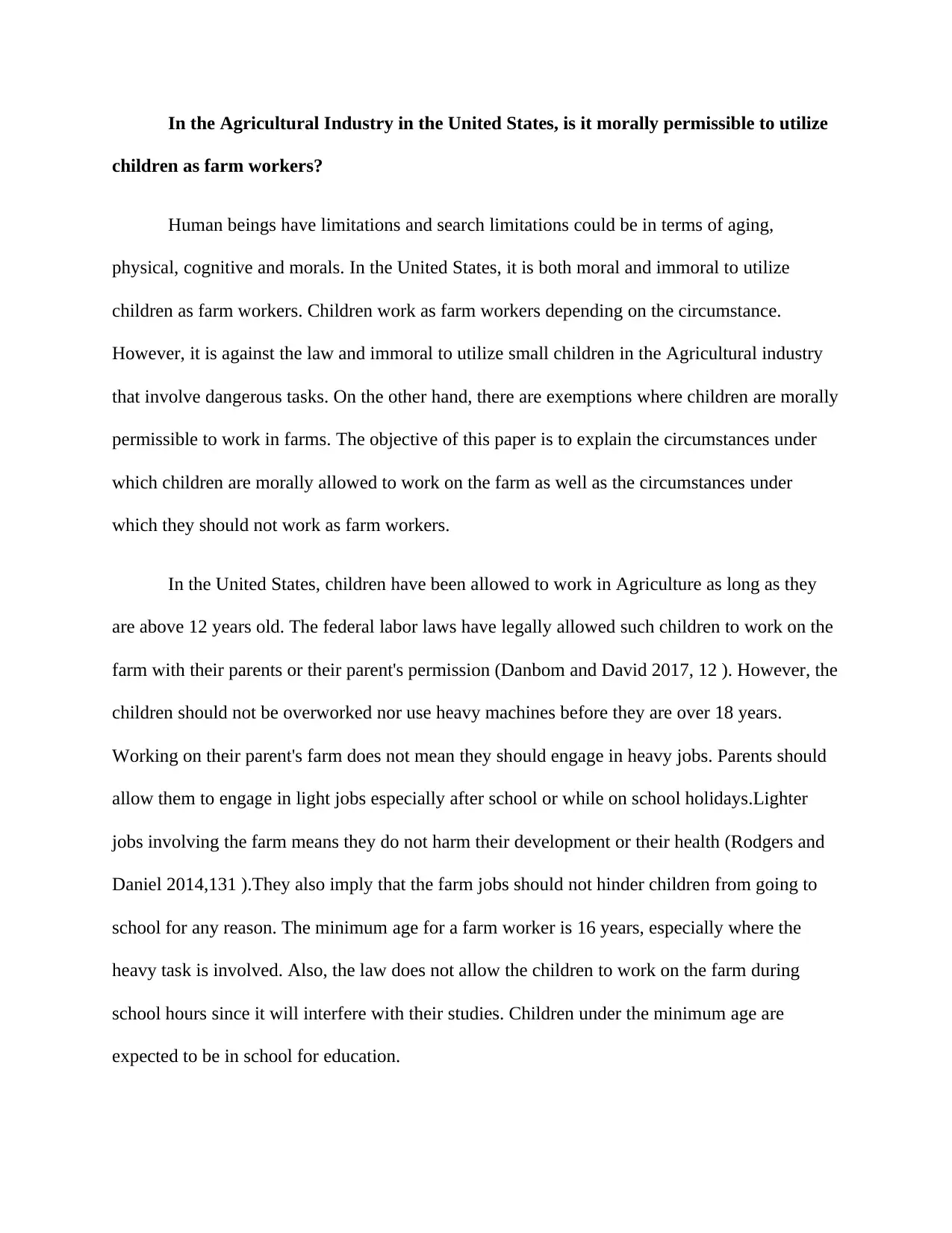
In the Agricultural Industry in the United States, is it morally permissible to utilize
children as farm workers?
Human beings have limitations and search limitations could be in terms of aging,
physical, cognitive and morals. In the United States, it is both moral and immoral to utilize
children as farm workers. Children work as farm workers depending on the circumstance.
However, it is against the law and immoral to utilize small children in the Agricultural industry
that involve dangerous tasks. On the other hand, there are exemptions where children are morally
permissible to work in farms. The objective of this paper is to explain the circumstances under
which children are morally allowed to work on the farm as well as the circumstances under
which they should not work as farm workers.
In the United States, children have been allowed to work in Agriculture as long as they
are above 12 years old. The federal labor laws have legally allowed such children to work on the
farm with their parents or their parent's permission (Danbom and David 2017, 12 ). However, the
children should not be overworked nor use heavy machines before they are over 18 years.
Working on their parent's farm does not mean they should engage in heavy jobs. Parents should
allow them to engage in light jobs especially after school or while on school holidays.Lighter
jobs involving the farm means they do not harm their development or their health (Rodgers and
Daniel 2014,131 ).They also imply that the farm jobs should not hinder children from going to
school for any reason. The minimum age for a farm worker is 16 years, especially where the
heavy task is involved. Also, the law does not allow the children to work on the farm during
school hours since it will interfere with their studies. Children under the minimum age are
expected to be in school for education.
children as farm workers?
Human beings have limitations and search limitations could be in terms of aging,
physical, cognitive and morals. In the United States, it is both moral and immoral to utilize
children as farm workers. Children work as farm workers depending on the circumstance.
However, it is against the law and immoral to utilize small children in the Agricultural industry
that involve dangerous tasks. On the other hand, there are exemptions where children are morally
permissible to work in farms. The objective of this paper is to explain the circumstances under
which children are morally allowed to work on the farm as well as the circumstances under
which they should not work as farm workers.
In the United States, children have been allowed to work in Agriculture as long as they
are above 12 years old. The federal labor laws have legally allowed such children to work on the
farm with their parents or their parent's permission (Danbom and David 2017, 12 ). However, the
children should not be overworked nor use heavy machines before they are over 18 years.
Working on their parent's farm does not mean they should engage in heavy jobs. Parents should
allow them to engage in light jobs especially after school or while on school holidays.Lighter
jobs involving the farm means they do not harm their development or their health (Rodgers and
Daniel 2014,131 ).They also imply that the farm jobs should not hinder children from going to
school for any reason. The minimum age for a farm worker is 16 years, especially where the
heavy task is involved. Also, the law does not allow the children to work on the farm during
school hours since it will interfere with their studies. Children under the minimum age are
expected to be in school for education.
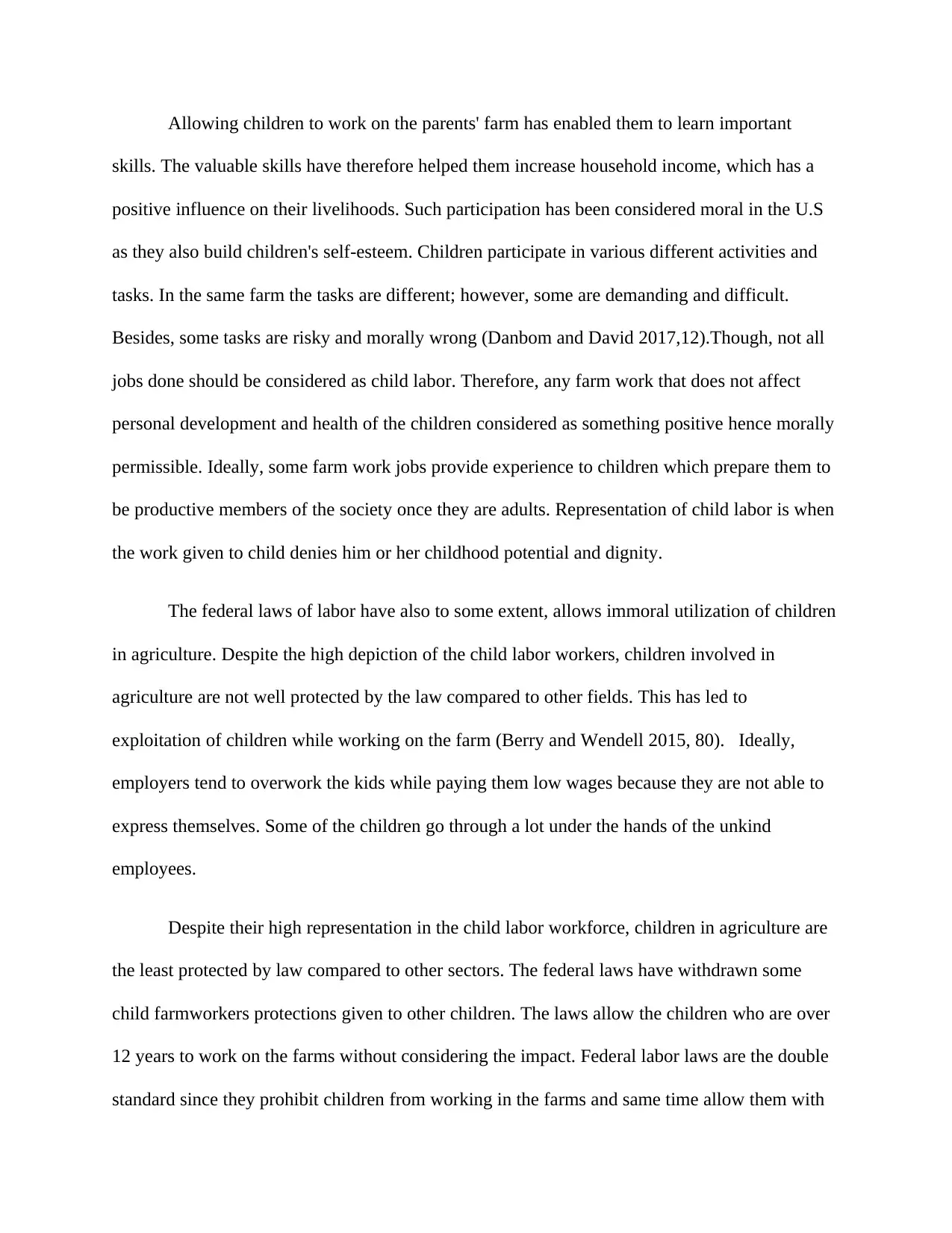
Allowing children to work on the parents' farm has enabled them to learn important
skills. The valuable skills have therefore helped them increase household income, which has a
positive influence on their livelihoods. Such participation has been considered moral in the U.S
as they also build children's self-esteem. Children participate in various different activities and
tasks. In the same farm the tasks are different; however, some are demanding and difficult.
Besides, some tasks are risky and morally wrong (Danbom and David 2017,12).Though, not all
jobs done should be considered as child labor. Therefore, any farm work that does not affect
personal development and health of the children considered as something positive hence morally
permissible. Ideally, some farm work jobs provide experience to children which prepare them to
be productive members of the society once they are adults. Representation of child labor is when
the work given to child denies him or her childhood potential and dignity.
The federal laws of labor have also to some extent, allows immoral utilization of children
in agriculture. Despite the high depiction of the child labor workers, children involved in
agriculture are not well protected by the law compared to other fields. This has led to
exploitation of children while working on the farm (Berry and Wendell 2015, 80). Ideally,
employers tend to overwork the kids while paying them low wages because they are not able to
express themselves. Some of the children go through a lot under the hands of the unkind
employees.
Despite their high representation in the child labor workforce, children in agriculture are
the least protected by law compared to other sectors. The federal laws have withdrawn some
child farmworkers protections given to other children. The laws allow the children who are over
12 years to work on the farms without considering the impact. Federal labor laws are the double
standard since they prohibit children from working in the farms and same time allow them with
skills. The valuable skills have therefore helped them increase household income, which has a
positive influence on their livelihoods. Such participation has been considered moral in the U.S
as they also build children's self-esteem. Children participate in various different activities and
tasks. In the same farm the tasks are different; however, some are demanding and difficult.
Besides, some tasks are risky and morally wrong (Danbom and David 2017,12).Though, not all
jobs done should be considered as child labor. Therefore, any farm work that does not affect
personal development and health of the children considered as something positive hence morally
permissible. Ideally, some farm work jobs provide experience to children which prepare them to
be productive members of the society once they are adults. Representation of child labor is when
the work given to child denies him or her childhood potential and dignity.
The federal laws of labor have also to some extent, allows immoral utilization of children
in agriculture. Despite the high depiction of the child labor workers, children involved in
agriculture are not well protected by the law compared to other fields. This has led to
exploitation of children while working on the farm (Berry and Wendell 2015, 80). Ideally,
employers tend to overwork the kids while paying them low wages because they are not able to
express themselves. Some of the children go through a lot under the hands of the unkind
employees.
Despite their high representation in the child labor workforce, children in agriculture are
the least protected by law compared to other sectors. The federal laws have withdrawn some
child farmworkers protections given to other children. The laws allow the children who are over
12 years to work on the farms without considering the impact. Federal labor laws are the double
standard since they prohibit children from working in the farms and same time allow them with
⊘ This is a preview!⊘
Do you want full access?
Subscribe today to unlock all pages.

Trusted by 1+ million students worldwide
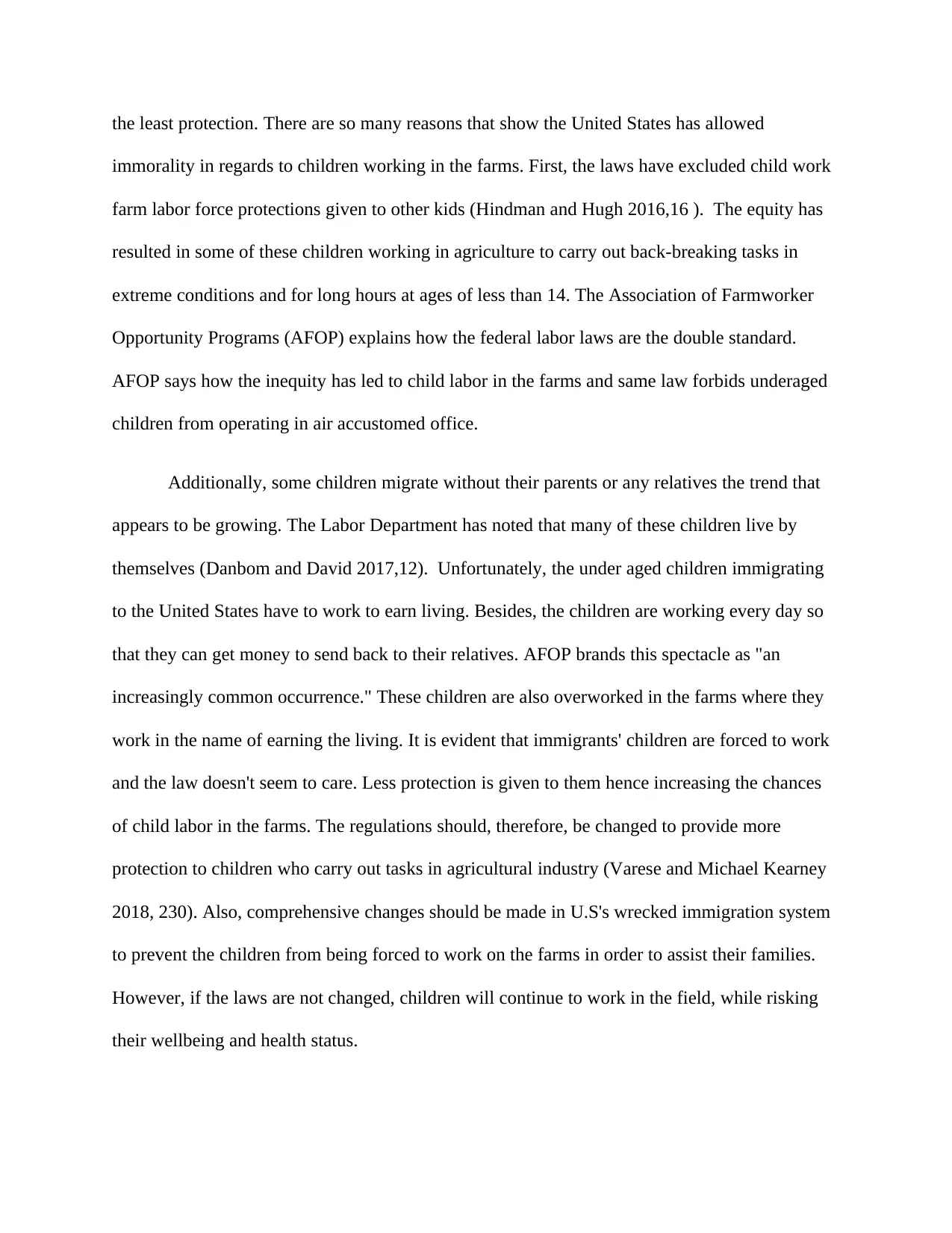
the least protection. There are so many reasons that show the United States has allowed
immorality in regards to children working in the farms. First, the laws have excluded child work
farm labor force protections given to other kids (Hindman and Hugh 2016,16 ). The equity has
resulted in some of these children working in agriculture to carry out back-breaking tasks in
extreme conditions and for long hours at ages of less than 14. The Association of Farmworker
Opportunity Programs (AFOP) explains how the federal labor laws are the double standard.
AFOP says how the inequity has led to child labor in the farms and same law forbids underaged
children from operating in air accustomed office.
Additionally, some children migrate without their parents or any relatives the trend that
appears to be growing. The Labor Department has noted that many of these children live by
themselves (Danbom and David 2017,12). Unfortunately, the under aged children immigrating
to the United States have to work to earn living. Besides, the children are working every day so
that they can get money to send back to their relatives. AFOP brands this spectacle as "an
increasingly common occurrence." These children are also overworked in the farms where they
work in the name of earning the living. It is evident that immigrants' children are forced to work
and the law doesn't seem to care. Less protection is given to them hence increasing the chances
of child labor in the farms. The regulations should, therefore, be changed to provide more
protection to children who carry out tasks in agricultural industry (Varese and Michael Kearney
2018, 230). Also, comprehensive changes should be made in U.S's wrecked immigration system
to prevent the children from being forced to work on the farms in order to assist their families.
However, if the laws are not changed, children will continue to work in the field, while risking
their wellbeing and health status.
immorality in regards to children working in the farms. First, the laws have excluded child work
farm labor force protections given to other kids (Hindman and Hugh 2016,16 ). The equity has
resulted in some of these children working in agriculture to carry out back-breaking tasks in
extreme conditions and for long hours at ages of less than 14. The Association of Farmworker
Opportunity Programs (AFOP) explains how the federal labor laws are the double standard.
AFOP says how the inequity has led to child labor in the farms and same law forbids underaged
children from operating in air accustomed office.
Additionally, some children migrate without their parents or any relatives the trend that
appears to be growing. The Labor Department has noted that many of these children live by
themselves (Danbom and David 2017,12). Unfortunately, the under aged children immigrating
to the United States have to work to earn living. Besides, the children are working every day so
that they can get money to send back to their relatives. AFOP brands this spectacle as "an
increasingly common occurrence." These children are also overworked in the farms where they
work in the name of earning the living. It is evident that immigrants' children are forced to work
and the law doesn't seem to care. Less protection is given to them hence increasing the chances
of child labor in the farms. The regulations should, therefore, be changed to provide more
protection to children who carry out tasks in agricultural industry (Varese and Michael Kearney
2018, 230). Also, comprehensive changes should be made in U.S's wrecked immigration system
to prevent the children from being forced to work on the farms in order to assist their families.
However, if the laws are not changed, children will continue to work in the field, while risking
their wellbeing and health status.
Paraphrase This Document
Need a fresh take? Get an instant paraphrase of this document with our AI Paraphraser
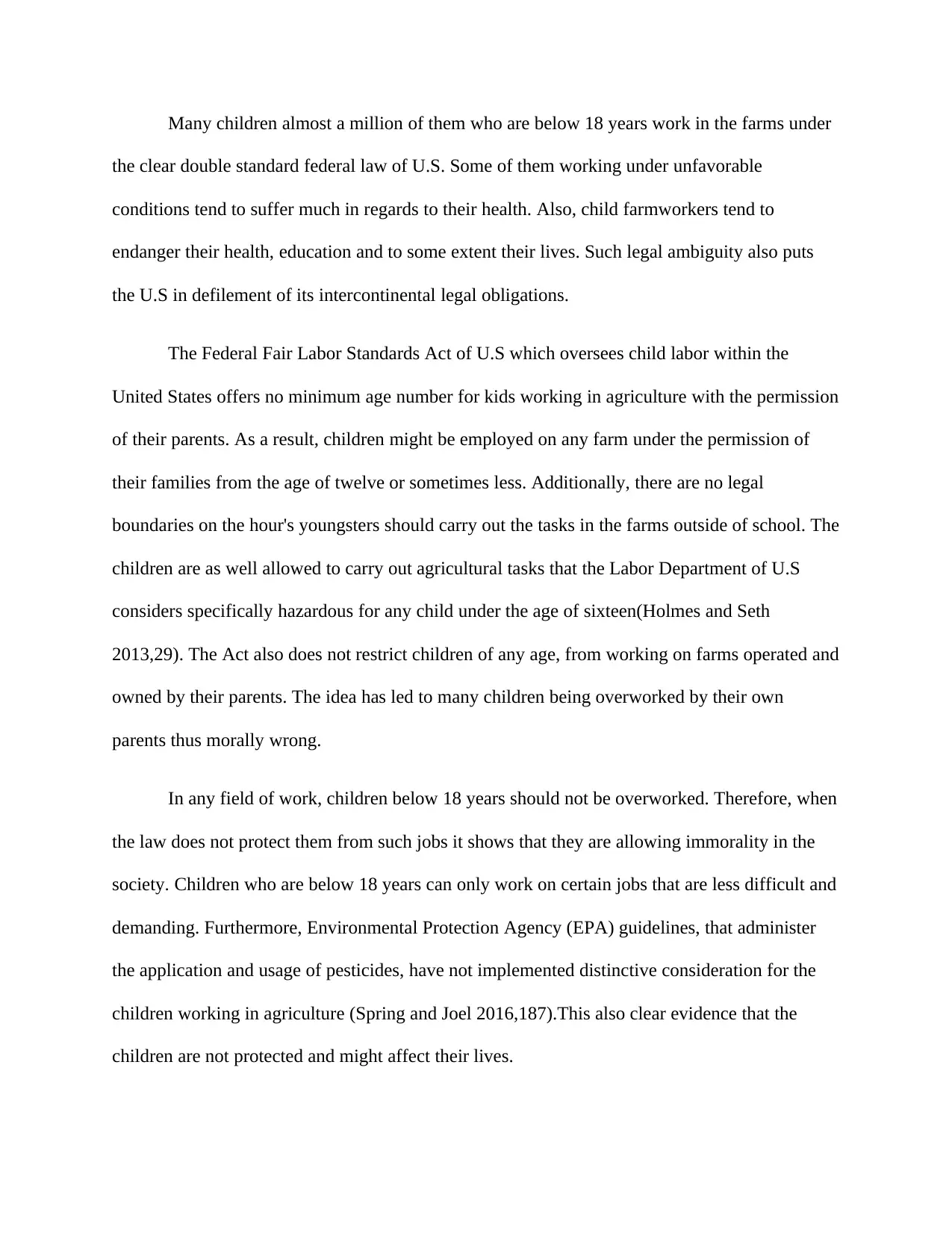
Many children almost a million of them who are below 18 years work in the farms under
the clear double standard federal law of U.S. Some of them working under unfavorable
conditions tend to suffer much in regards to their health. Also, child farmworkers tend to
endanger their health, education and to some extent their lives. Such legal ambiguity also puts
the U.S in defilement of its intercontinental legal obligations.
The Federal Fair Labor Standards Act of U.S which oversees child labor within the
United States offers no minimum age number for kids working in agriculture with the permission
of their parents. As a result, children might be employed on any farm under the permission of
their families from the age of twelve or sometimes less. Additionally, there are no legal
boundaries on the hour's youngsters should carry out the tasks in the farms outside of school. The
children are as well allowed to carry out agricultural tasks that the Labor Department of U.S
considers specifically hazardous for any child under the age of sixteen(Holmes and Seth
2013,29). The Act also does not restrict children of any age, from working on farms operated and
owned by their parents. The idea has led to many children being overworked by their own
parents thus morally wrong.
In any field of work, children below 18 years should not be overworked. Therefore, when
the law does not protect them from such jobs it shows that they are allowing immorality in the
society. Children who are below 18 years can only work on certain jobs that are less difficult and
demanding. Furthermore, Environmental Protection Agency (EPA) guidelines, that administer
the application and usage of pesticides, have not implemented distinctive consideration for the
children working in agriculture (Spring and Joel 2016,187).This also clear evidence that the
children are not protected and might affect their lives.
the clear double standard federal law of U.S. Some of them working under unfavorable
conditions tend to suffer much in regards to their health. Also, child farmworkers tend to
endanger their health, education and to some extent their lives. Such legal ambiguity also puts
the U.S in defilement of its intercontinental legal obligations.
The Federal Fair Labor Standards Act of U.S which oversees child labor within the
United States offers no minimum age number for kids working in agriculture with the permission
of their parents. As a result, children might be employed on any farm under the permission of
their families from the age of twelve or sometimes less. Additionally, there are no legal
boundaries on the hour's youngsters should carry out the tasks in the farms outside of school. The
children are as well allowed to carry out agricultural tasks that the Labor Department of U.S
considers specifically hazardous for any child under the age of sixteen(Holmes and Seth
2013,29). The Act also does not restrict children of any age, from working on farms operated and
owned by their parents. The idea has led to many children being overworked by their own
parents thus morally wrong.
In any field of work, children below 18 years should not be overworked. Therefore, when
the law does not protect them from such jobs it shows that they are allowing immorality in the
society. Children who are below 18 years can only work on certain jobs that are less difficult and
demanding. Furthermore, Environmental Protection Agency (EPA) guidelines, that administer
the application and usage of pesticides, have not implemented distinctive consideration for the
children working in agriculture (Spring and Joel 2016,187).This also clear evidence that the
children are not protected and might affect their lives.
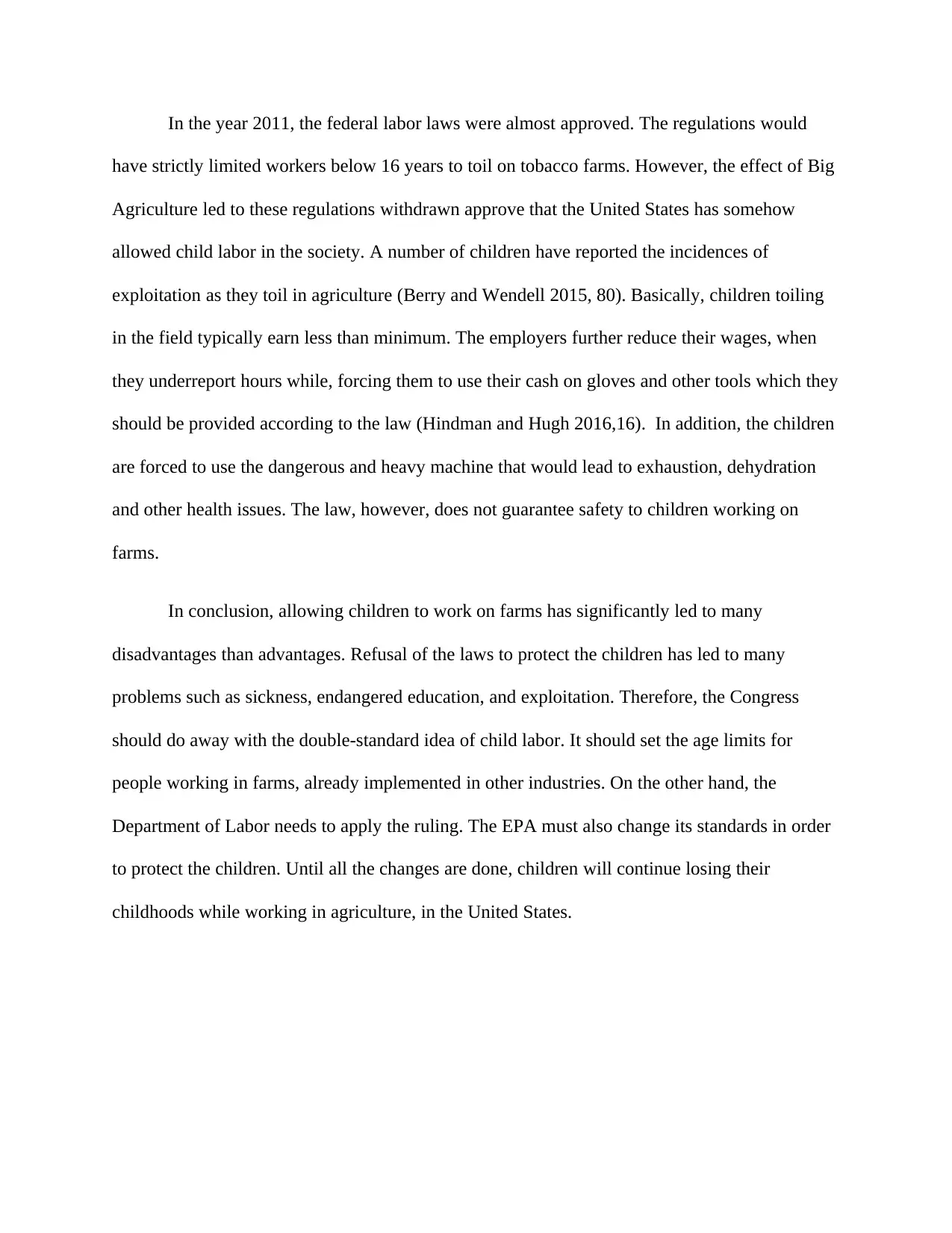
In the year 2011, the federal labor laws were almost approved. The regulations would
have strictly limited workers below 16 years to toil on tobacco farms. However, the effect of Big
Agriculture led to these regulations withdrawn approve that the United States has somehow
allowed child labor in the society. A number of children have reported the incidences of
exploitation as they toil in agriculture (Berry and Wendell 2015, 80). Basically, children toiling
in the field typically earn less than minimum. The employers further reduce their wages, when
they underreport hours while, forcing them to use their cash on gloves and other tools which they
should be provided according to the law (Hindman and Hugh 2016,16). In addition, the children
are forced to use the dangerous and heavy machine that would lead to exhaustion, dehydration
and other health issues. The law, however, does not guarantee safety to children working on
farms.
In conclusion, allowing children to work on farms has significantly led to many
disadvantages than advantages. Refusal of the laws to protect the children has led to many
problems such as sickness, endangered education, and exploitation. Therefore, the Congress
should do away with the double-standard idea of child labor. It should set the age limits for
people working in farms, already implemented in other industries. On the other hand, the
Department of Labor needs to apply the ruling. The EPA must also change its standards in order
to protect the children. Until all the changes are done, children will continue losing their
childhoods while working in agriculture, in the United States.
have strictly limited workers below 16 years to toil on tobacco farms. However, the effect of Big
Agriculture led to these regulations withdrawn approve that the United States has somehow
allowed child labor in the society. A number of children have reported the incidences of
exploitation as they toil in agriculture (Berry and Wendell 2015, 80). Basically, children toiling
in the field typically earn less than minimum. The employers further reduce their wages, when
they underreport hours while, forcing them to use their cash on gloves and other tools which they
should be provided according to the law (Hindman and Hugh 2016,16). In addition, the children
are forced to use the dangerous and heavy machine that would lead to exhaustion, dehydration
and other health issues. The law, however, does not guarantee safety to children working on
farms.
In conclusion, allowing children to work on farms has significantly led to many
disadvantages than advantages. Refusal of the laws to protect the children has led to many
problems such as sickness, endangered education, and exploitation. Therefore, the Congress
should do away with the double-standard idea of child labor. It should set the age limits for
people working in farms, already implemented in other industries. On the other hand, the
Department of Labor needs to apply the ruling. The EPA must also change its standards in order
to protect the children. Until all the changes are done, children will continue losing their
childhoods while working in agriculture, in the United States.
⊘ This is a preview!⊘
Do you want full access?
Subscribe today to unlock all pages.

Trusted by 1+ million students worldwide
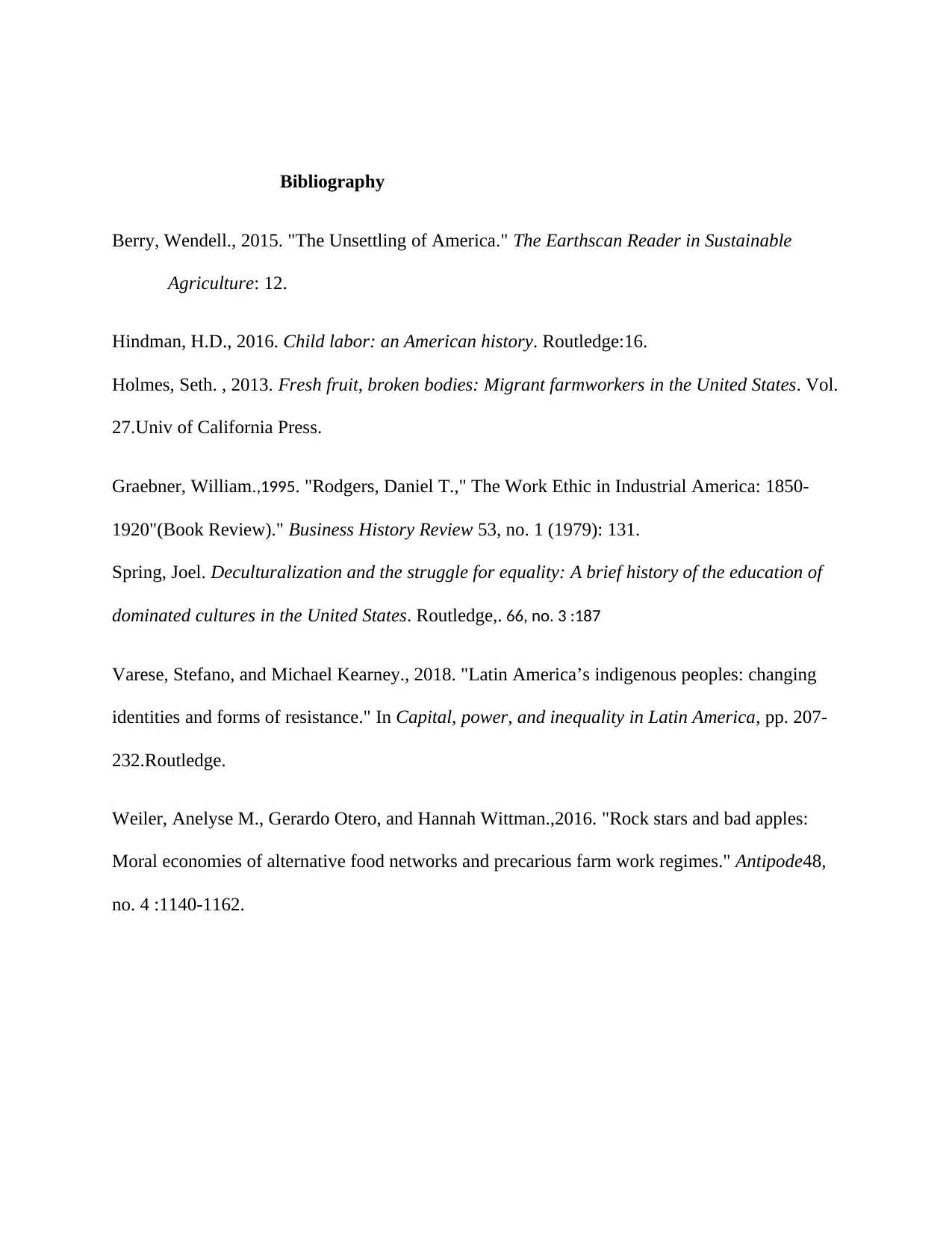
Bibliography
Berry, Wendell., 2015. "The Unsettling of America." The Earthscan Reader in Sustainable
Agriculture: 12.
Hindman, H.D., 2016. Child labor: an American history. Routledge:16.
Holmes, Seth. , 2013. Fresh fruit, broken bodies: Migrant farmworkers in the United States. Vol.
27.Univ of California Press.
Graebner, William.,1995. "Rodgers, Daniel T.," The Work Ethic in Industrial America: 1850-
1920"(Book Review)." Business History Review 53, no. 1 (1979): 131.
Spring, Joel. Deculturalization and the struggle for equality: A brief history of the education of
dominated cultures in the United States. Routledge,. 66, no. 3 :187
Varese, Stefano, and Michael Kearney., 2018. "Latin America’s indigenous peoples: changing
identities and forms of resistance." In Capital, power, and inequality in Latin America, pp. 207-
232.Routledge.
Weiler, Anelyse M., Gerardo Otero, and Hannah Wittman.,2016. "Rock stars and bad apples:
Moral economies of alternative food networks and precarious farm work regimes." Antipode48,
no. 4 :1140-1162.
Berry, Wendell., 2015. "The Unsettling of America." The Earthscan Reader in Sustainable
Agriculture: 12.
Hindman, H.D., 2016. Child labor: an American history. Routledge:16.
Holmes, Seth. , 2013. Fresh fruit, broken bodies: Migrant farmworkers in the United States. Vol.
27.Univ of California Press.
Graebner, William.,1995. "Rodgers, Daniel T.," The Work Ethic in Industrial America: 1850-
1920"(Book Review)." Business History Review 53, no. 1 (1979): 131.
Spring, Joel. Deculturalization and the struggle for equality: A brief history of the education of
dominated cultures in the United States. Routledge,. 66, no. 3 :187
Varese, Stefano, and Michael Kearney., 2018. "Latin America’s indigenous peoples: changing
identities and forms of resistance." In Capital, power, and inequality in Latin America, pp. 207-
232.Routledge.
Weiler, Anelyse M., Gerardo Otero, and Hannah Wittman.,2016. "Rock stars and bad apples:
Moral economies of alternative food networks and precarious farm work regimes." Antipode48,
no. 4 :1140-1162.
1 out of 7
Related Documents
Your All-in-One AI-Powered Toolkit for Academic Success.
+13062052269
info@desklib.com
Available 24*7 on WhatsApp / Email
![[object Object]](/_next/static/media/star-bottom.7253800d.svg)
Unlock your academic potential
Copyright © 2020–2026 A2Z Services. All Rights Reserved. Developed and managed by ZUCOL.





